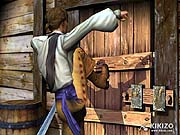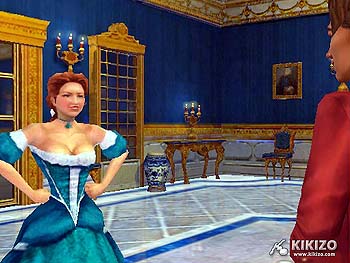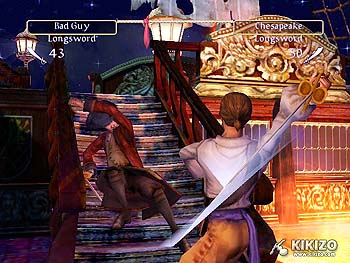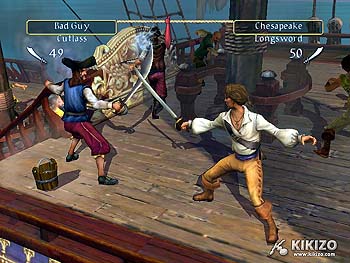Sid Meier's Pirates!
Does the recent remake of Pirates! swindle the goods? We hit the Caribbean to find arrrt (sorry).
| Version PC, Xbox | Developer Firaxis | Publisher Atari (PC), Maxis (Xb) | Genre Adventure |
||||
The original Pirates! is a game that many recall as the first properly open-ended effort at a video game. Whether it actually was is another matter, but this 2005 remake certainly has more competition than its predecessor. "Open-ended" seems to be synonymous with "credible" in some gaming circles these days, and Pirates' free-roaming nature is no longer enough to distinguish it from the crowd.

What does distinguish Pirates is its cheerful, hearty portrayal of life on the seven seas and its full-on, adventure-packed style. The game's visuals are bold and bright, its sound suitably buccaneering and its gameplay extremely addictive. This is, dare I say, probably far more fun than actually being a pirate. This game draws you in, puts a big smile on your face and makes you want to shout "Yarr!" at five-minute intervals - it his spirit that other games only dream of.
Upon starting a game with your enterprising new buccaneer, it might not appear like there are a lot of options. Choosing a profession, difficulty level and allied country seems, indeed, somewhat arbitrary. Your allied country means nothing whatsoever, as you can destroy ships at will be they French, Dutch, English or Spanish - your actions, like those of all good pirates, are usually determined by how much booty a particular conquest is likely to yield as opposed to by allegiance. Professions do mean slightly more, as they determine your buccaneer's particular skill, but it still has little effect on the gameplay.
Upon actually starting the game, however, it immediately becomes clear that there are indeed many options open to the player. The Pirates! in-game environment is huge and the map is randomly drawn each time you start a game - getting from one side of the seven seas to the other takes about half a year of game time. It's up to you whether you follow the game's quest path - a sequence of challenges which eventually resolve the game's storyline - or simply sail around at will, collecting treasure maps which you may or may not follow later.
Your avatar, for much of the game, is your flagship and its fleet. Sailing around the massive map, one can either visit ports (of which there are many) in an attempt to gain promotions from different countries and pick up interesting items from mysterious vendors (as well, of course, as buying and selling your plunder), or engage other ships in combat out on the open waters. The crew will need to feel as if it's bringing in sufficient plunder if it's to be kept happy - there will have to be plenty of ship-sinking action if a mutiny is to be avoided. At the end of a long voyage, plunder is divided between the crew, and you can either retire from pirating or start all over again at a slightly higher difficulty.
It's actually quite unlikely that you'll follow the quest path during your pirate's first career. The urge to attack every ship that appears and build up an enormous fortune is difficult to resist - finding the time or inclination to do specific quests is difficult. Ten or twenty years' worth of happy pillaging can fly by - I found myself playing through my pirate's first career in one five-hour sitting.
The fact that you don't actually HAVE to do anything is beneficial - whatever the player does, as long as he's accumulating a large fortune, the game won't try to force him in any given direction. On a second or third play-through, the player will probably feel like following the quest path of his own volition.
It also, however, means that the game feels somewhat directionless. Although it is eminently playable - boarding ships, swordfighting and romancing governors' daughters is excellent fun - you do get to the point where you wonder what the point of it all is supposed to be. The quest path is just a sequence of challenges - 'Find buried treasure', 'find your long-lost sister', 'marry a governor's daughter', et cetera - that essentially feel quite unstructured.
There's also the fact that, essentially, there are only two things you can do - sail around battling ships, or visit ports and choose an option (buying, selling, recruiting, visiting the governor) from a menu. Pirates! feels oddly like a strategic pirate management game at times rather than a seven-seas adventure, most probably because of the general lack of an on-screen avatar with which the player can connect.
There's also the problem of keeping the crew happy - on any of the harder difficulties, crews can be exceptionally demanding, meaning that you'll have to spend all your time sinking ships and have very little left for doing quests or sailing far across the map. The Xbox conversion also suffers from a few bugs, some of which are crippling - getting stuck in an area of sea between two towns, for instance, entirely unable to escape, after a healthy twenty years' worth of pirating career ad being forced to start again from a previous save is most, most irksome, I can assure you.
Despite its general directionless nature and deceptively unapparent limitations, however, Pirates! is still enormous fun to play. The fact that following the quest path can be irksome is irrelevant, as you don't actually have to follow it - you can just as easily get caught up in the fun of impulsive exploration and the accumulation of a vast fortune in plunder. This game is a fine purchase for anyone looking for a slice of seven-seas adventure in their own home, and a worthy update to the original Sid Meier classic.
| ||||||||||||
|

























 Satoru Iwata Video Interview - the late Nintendo president spoke with Kikizo in 2004 as 'Nintendo Revolution' loomed.
Satoru Iwata Video Interview - the late Nintendo president spoke with Kikizo in 2004 as 'Nintendo Revolution' loomed. Kaz Hirai Video Interview - the first of Kikizo's interviews with the man who went on to become global head of Sony.
Kaz Hirai Video Interview - the first of Kikizo's interviews with the man who went on to become global head of Sony. Ed Fries Video Interview - one of Xbox's founders discusses an epic journey from Excel to Xbox.
Ed Fries Video Interview - one of Xbox's founders discusses an epic journey from Excel to Xbox. Yu Suzuki, the Kikizo Interview - we spend time with one of gaming's most revered creators.
Yu Suzuki, the Kikizo Interview - we spend time with one of gaming's most revered creators. Tetris - The Making of an Icon: Alexey Pajitnov and Henk Rogers reveal the fascinating story behind Tetris
Tetris - The Making of an Icon: Alexey Pajitnov and Henk Rogers reveal the fascinating story behind Tetris Rare founders, Chris and Tim Stamper - their only interview? Genuinely 'rare' sit down with founders of the legendary studio.
Rare founders, Chris and Tim Stamper - their only interview? Genuinely 'rare' sit down with founders of the legendary studio. The History of First-Person Shooters - a retrospective, from Maze War to Modern Warfare
The History of First-Person Shooters - a retrospective, from Maze War to Modern Warfare